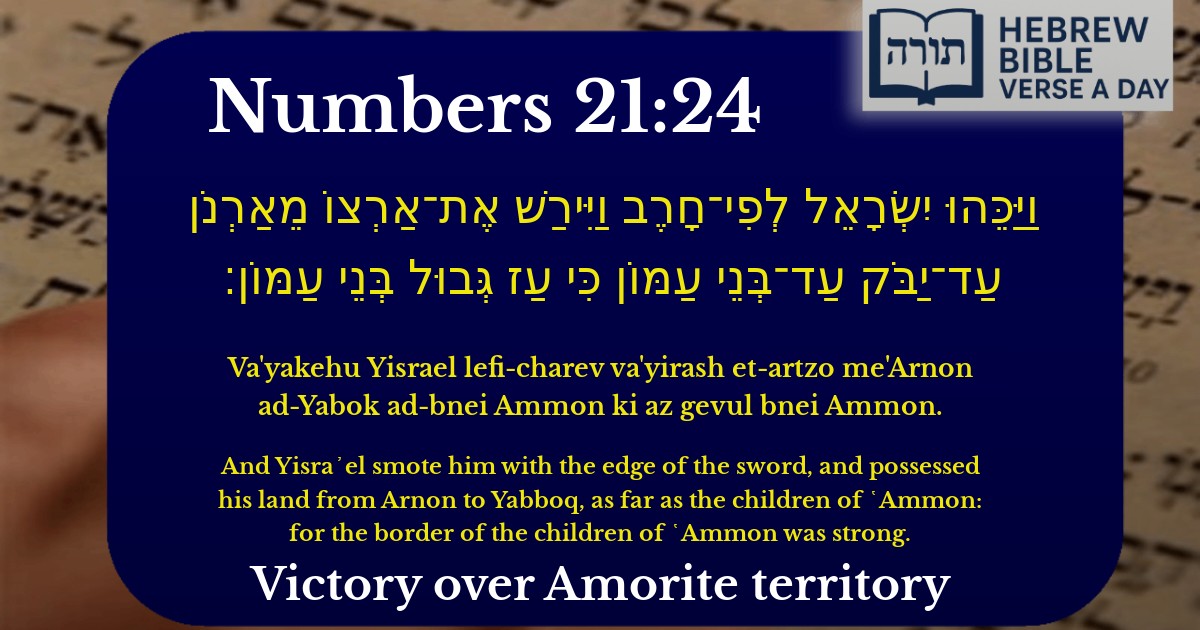Join Our Newsletter To Be Informed When New Videos Are Posted
Join the thousands of fellow Studends who rely on our videos to learn how to read the bible in Hebrew for free!
Hebrew Text
וַיַּכֵּהוּ יִשְׂרָאֵל לְפִי־חָרֶב וַיִּירַשׁ אֶת־אַרְצוֹ מֵאַרְנֹן עַד־יַבֹּק עַד־בְּנֵי עַמּוֹן כִּי עַז גְּבוּל בְּנֵי עַמּוֹן׃
English Translation
And Yisra᾽el smote him with the edge of the sword, and possessed his land from Arnon to Yabboq, as far as the children of ῾Ammon: for the border of the children of ῾Ammon was strong.
Transliteration
Va'yakehu Yisrael lefi-charev va'yirash et-artzo me'Arnon ad-Yabok ad-bnei Ammon ki az gevul bnei Ammon.
Hebrew Leining Text
וַיַּכֵּ֥הוּ יִשְׂרָאֵ֖ל לְפִי־חָ֑רֶב וַיִּירַ֨שׁ אֶת־אַרְצ֜וֹ מֵֽאַרְנֹ֗ן עַד־יַבֹּק֙ עַד־בְּנֵ֣י עַמּ֔וֹן כִּ֣י עַ֔ז גְּב֖וּל בְּנֵ֥י עַמּֽוֹן׃
Parasha Commentary
📚 Talmud Citations
This verse is not quoted in the Talmud.


Context of the Verse
This verse (Bamidbar 21:24) describes the military victory of Bnei Yisrael over Sichon, king of the Emori, and the subsequent conquest of his territory. The verse emphasizes the extent of the land taken—from the Arnon River to the Yabboq River—and notes the strength of the border of Bnei Ammon, which prevented further expansion.
Rashi's Explanation
Rashi (Bamidbar 21:24) clarifies that the phrase "כִּי עַז גְּבוּל בְּנֵי עַמּוֹן" ("for the border of the children of ῾Ammon was strong") means that Hashem had previously commanded Bnei Yisrael not to wage war against Bnei Ammon (Devarim 2:19). Therefore, even though the land beyond the Yabboq was desirable, they did not conquer it due to this divine prohibition. The strength of the border was not merely physical but also a reflection of Hashem's decree.
Ramban's Insight
The Ramban (Bamidbar 21:24) adds that the Torah highlights the strength of Bnei Ammon's border to emphasize that Bnei Yisrael's victories were not due to their own military prowess alone, but because Hashem granted them success within the boundaries He set. The exclusion of Bnei Ammon's land was a test of their obedience to divine commandments.
Midrashic Perspective
The Midrash (Bamidbar Rabbah 19:25) connects this verse to the broader theme of divine justice. It explains that Sichon had previously taken this land from Moav, and now Bnei Yisrael were permitted to conquer it from him as part of Hashem's plan. The mention of Bnei Ammon serves as a reminder that each nation's territory was allotted according to divine will.
Halachic Implications